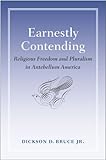Earnestly contending : religious freedom and pluralism in antebellum America / Dickson D. Bruce Jr.
Material type: TextPublication details: Charlottesville : University of Virginia Press, 2013.Description: 1 online resource (210 pages)Content type:
TextPublication details: Charlottesville : University of Virginia Press, 2013.Description: 1 online resource (210 pages)Content type: - 9780813933641
- 0813933641
- Freedom of religion -- United States -- History -- 19th century
- Religious pluralism -- United States -- History -- 19th century
- United States -- Church history -- 19th century
- Church and state -- United States -- History -- 19th century
- Liberté religieuse -- États-Unis -- Histoire -- 19e siècle
- États-Unis -- Histoire religieuse -- 19e siècle
- Église et État -- États-Unis -- Histoire -- 19e siècle
- RELIGION -- Christianity -- History
- HISTORY -- United States -- General
- Church and state
- Freedom of religion
- Religious pluralism
- United States
- 1800-1899
- 277.5/081 23
- BR516 .B76 2013eb
- online - EBSCO
| Item type | Current library | Call number | URL | Status | Notes | Barcode | |
|---|---|---|---|---|---|---|---|
 eBook
eBook
|
Biblioteca "Angelicum" Pont. Univ. S.Tommaso d'Aquino Nuvola online | online - EBSCO (Browse shelf(Opens below)) | Online access | Not for loan (Accesso limitato) | Accesso per gli utenti autorizzati / Access for authorized users | (ebsco)516085 |
Includes bibliographical references and index.
Print version record.
Introduction; "Divisions among You"; "And They Shall Contend One with Another"; "And the Truth of the Lord Endureth Forever"; "With One Spirit, with One Mind"; "The Keeper of Her Laws"; "That This Land; "The Knowledge of the Holy"; Conclusion; Notes; Index.
English.
In Earnestly Contending, Dickson Bruce examines the ways in which religious denominations and movements in antebellum America coped with the ideals of freedom and pluralism that exerted such a strong influence on the larger, national culture. Despite their enormous normative power, these still-evolving ideals--themselves partly religious in origin--ran up against deeply entrenched concerns about the integrity of religious faith and commitment and the role of religion in society. The resulting tensions between these ideals and desires for religious consensus and coherence would remain unresolved throughout the period. Focusing on that era's interdenominational competition, Bruce explores the possibilities for and barriers to realizing ideals of freedom and pluralism in antebellum America. He examines the nature of religion from the perspectives of anthropology and cognitive sciences, as well as history, and uses this interdisciplinary approach to organize and understand specific tendencies in the antebellum period while revealing properties inherent in religion as a social and cultural phenomenon. He goes on to show how issues from that era have continued to play a role in American religious thinking, and how they might shed light on the controversies of our own time.


